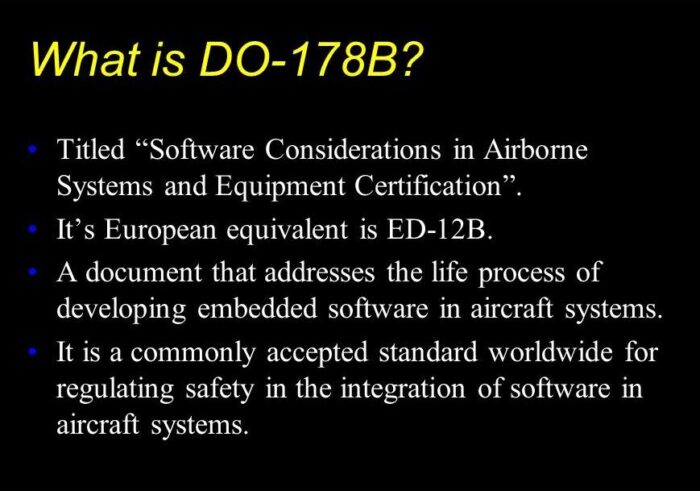0(0 Ratings)
DO-178C: An Introduction to Airborne Software Certification Standard

About Course
DO-178 is the international and de facto standard for certifying all aviation safety-critical software developed by the Radio Technical Commission for Aeronautics (RTCA) in 1992. The purpose of DO-178 is to provide guidance for developing airborne software systems to ensure that it performs its intended function with a level of confidence that commiserates with its airworthiness requirement.
Course Curriculum
Airborne Systems Safety
-
Need for Airborne Systems Safety
00:00 -
Regulatory Standards for Airborne Systems
00:00
Introduction to DO-178 Standard
-
What is DO-178?
00:00 -
Objectives and activities
00:00 -
Design Assurance Level (DAL)
00:00 -
Demonstrating compliance
00:00 -
DO-178 Versions
00:00
DO-178 Planning
-
Software Development Life Cycle (SDLC)
00:00 -
Software life cycle processes
00:00 -
DO-178 Planning
00:00 -
Software Objectives
00:00 -
Software Configuration Management Plan (SCMP)
00:00 -
Software Quality Assurance (SQAP)
00:00
Software Development and Design
-
Software Development
00:00 -
Requirements Management
00:00 -
Software Design
00:00 -
Software Implementation and Coding Standard
00:00
Software Verification and Testing
The DO-178C based software testing involves three levels as described in Section 6.4 of the standard viz., Low-level testing, software integration testing, and hardware/software integration testing. DO-178B/C assures the robustness and reliability sought during the development and testing of airborne software.
But testing has a well-known intrinsic drawback; as quipped by the late computer scientist Edsger Dijkstra, it can show the presence of bugs but never their absence. DO-178C mitigates this issue in several ways:
• Instead of “white box” or unit testing, DO-178C mandates requirements-based testing. Each requirement must have associated tests, exercising both normal processing and error handling, to demonstrate that the requirement is met and that invalid inputs are properly handled. The testing is focused on what the system is supposed to do, not on the overall functionality of each module.
• Testing is augmented by inspections and analyses to increase the likelihood of detecting errors early.
-
Software Verification
00:00 -
Software testing: Static and Dynamic Analysis
00:00 -
Structural Coverage Analysis
00:00 -
DO-178 dead code
00:00
Software Tools
-
Automated Tools
00:00 -
Tool Qualification
00:00
Technology Supplements
Since the publication of DO-178B in 1992, a number of software engineering methodologies have matured and offer benefits (and also raise issues) for developers of airborne systems. A major part of the DO-178C effort was devoted to analyzing the issues surrounding three specific technologies and preparing supplements that adapt and extend the core DO-178C guidance as appropriate.
One of the significant changes in DO-178C from DO-178B is that there are four additional supplements that may be used in conjunction with the DO-178C. These supplements cover
model based development and verification supplement (DO-331.); Object-oriented technology and related techniques supplement (DO-332); formal methods supplement (DO-333) and software tool qualification considerations (DO-330).
-
Model-Based Development and Verification (RTCA DO-331 / EUROCAE ED-218)
00:00 -
Object-Oriented Technology and Related Techniques (RTCA DO-332 / EUROCAE ED-217)
00:00 -
Formal Methods (RTCA DO-333 / EUROCAE ED-216)
00:00
Additional Considerations
-
Cost factors
00:00 -
What are the DO-178 certification risks?
00:00 -
Lessons learned
00:00
$0.96
-
Last UpdatedFebruary 6, 2023
Hi, Welcome back!